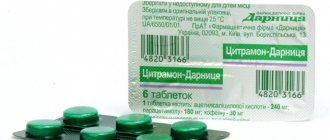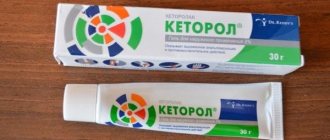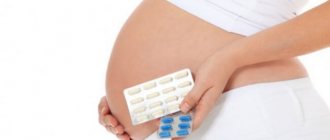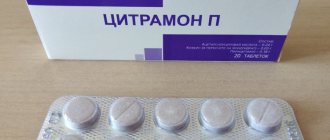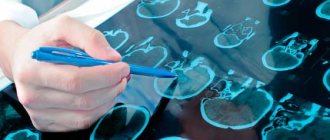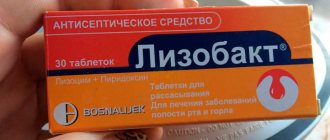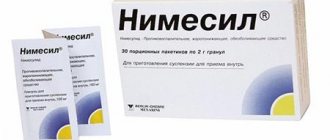Headache, runny nose, colds are painful conditions that are familiar to many people. And most cope with them in the traditional way - with the help of a citramon tablet.
What should a nursing woman do during lactation, who must be careful with all foods and medications? Can she take a familiar medication as usual while breastfeeding? How will the baby's body react to the medication? Let's look into this thoroughly and give answers to these and other questions.
Composition of citramon
The composition of the tablets is indicated on each package of citramon, as well as the instructions. Each tablet consists of a balanced complex, which includes 3 drugs:
- aspirin (acetylsalicylic acid) – 240 mg;
- paracetamol – 180 mg;
- caffeine – 30 mg.
Each of these components has a special effect on the body. Drinking citramon means taking each of them in the indicated dosage.
Citramon for headaches during lactation is a last resort when there is no other way to combat the ailment.
Alternative Treatment
Walking in the fresh air and rubbing your temple with Vietnamese “Star” balm will help eliminate headaches. In addition, tea with lemon or honey is an excellent remedy. Of course, if the baby is not allergic to these products.
To reduce other types of pain, you can take Nurofen or Ibuprofen. These are relatively harmless drugs that have minimal effect on the baby’s body.
At temperatures above 37 degrees, Paracetamol, which does not contain dangerous acid, will be safe and will quickly relieve fever and inflammation. In addition, the drug is eliminated from the mother’s body within two hours.
Thus, during lactation you can consume:
Naproxen and ketoprofen also do not cause severe side effects. However, studies of the effect of these drugs on the child’s body have begun recently, so the medicine should be taken with caution.
Remember that any medicine during lactation can only be taken after consulting a doctor. In addition, certain rules must be followed when taking it.
Aspirin
Has an anti-inflammatory effect. It can relieve fever, reduce temperature, relieve pain. Another important quality of acetylsalicylic acid is its ability to make the blood less thick, which prevents blood clots.
Blood thinning under the influence of aspirin is beneficial for an adult, but is harmful for a fragile child’s body. Aspirin passes into the milk and is passed on to the baby.
Possible negative effects of acetylsalicylic acid for a newborn:
- external and internal bleeding;
- the appearance of ulcers on the gastric mucosa;
- disorders of the kidneys and liver.
Aspirin can disrupt a baby's sleep, impair vision or hearing, and possibly cause an allergic skin rash. These properties of aspirin have introduced a ban on its use in children under 12 years of age (in European countries - up to 16 years of age).
Walking in the fresh air is an excellent remedy for headaches during breastfeeding. While breastfeeding, migraines can be a sign of dehydration: try drinking a glass of water. During lactation, liquid is also useful.
Harm of Citramon for a child
Citramon is a combination drug that contains paracetamol, aspirin (acetylsalicylic acid) and caffeine. It helps with dental, headache, muscle, menstrual and other pains, with infections and colds, and fever.
- hemorrhagic diathesis – bleeding and skin bruising, low blood clotting;
- irritation of the digestive system – nausea, vomiting, liver dysfunction;
- bronchial asthma;
- increased excitability and sleep disturbance;
- allergies: rash, itching;
- deterioration of vision and hearing, tinnitus;
- inhibits the functioning of nerve cells.
Severe side effects indicate that the baby should not be exposed to such a risk. Citramon should not be taken while breastfeeding. Nursing mothers with severe pain can use other means and methods.
Why is Citramon dangerous for babies? Because this medicine, namely its component acetylsalicylic acid, has a large number of adverse reactions and can harm the baby. Often the medicine causes the development of bronchial asthma, deterioration of the child’s hearing and vision.
- has a negative impact on the functioning of the digestive tract and can provoke the development of ulcers and erosions;
- adversely affects the functioning of the liver and kidneys;
- impairs blood clotting, severe nasal or internal bleeding may occur;
- provokes the appearance of severe allergic reactions - from skin rashes of varying degrees of intensity to anaphylactic shock;
- development of hemorrhagic diathesis;
- the baby becomes nervous and sleeps poorly;
- Citramon can provoke migraines and dizziness in infants.
Even a single dose of medication can negatively affect your baby's health, so you should not take it while breastfeeding.
5-6 days after the mother takes the medicine, the baby may begin to vomit severely, develop severe dehydration, and due to increased intracranial pressure, the tension of the large fontanelle may increase.
The consequence is convulsions, breathing problems, coma, deterioration of brain function, mental retardation. And all this can be provoked by ordinary “safe” Citramon.
Paracetamol
Another anti-inflammatory drug in citramone is paracetamol. It has properties similar to aspirin and enhances its effects. However, paracetamol is a “softer” drug. Its effects begin very quickly because paracetamol is absorbed by the body in a short time. At the same time, it is safe for the gastric mucosa and does not lead to its destruction.
For a nursing mother, the most important thing is that paracetamol is not a medicine harmful to the baby.
Can I take the drug while breastfeeding?
A woman during lactation is not recommended to use any medications without specific indications , much less abuse them. The same can be said about Citramon.
It is not advisable to take Citramon during frequent breastfeeding, which usually happens up to 6 months.
If the frequency of breastfeeding is reduced over time, including due to the introduction of complementary foods, artificial milk formulas, as an exception, a single use of the drug is allowed.
The danger of Citramon is that, in addition to paracetamol and caffeine - the main active ingredients, it contains aspirin, which is contraindicated for children.
This component causes the greatest harm to infants, so it should not enter the child’s body even with mother’s milk.
Caffeine
Being a natural stimulant, caffeine affects respiratory activity, brain function and the cardiovascular system. It supports performance, restores vigor, and improves metabolism.
But the baby’s body may not be able to cope with the effects of the stimulant. From caffeine, children become overly excited and are unable to calm down and fall asleep for a long time.
Two of the three components (aspirin and caffeine) present in the tablet are undesirable for the baby and in their pure form are not recommended for a nursing mother.
What is Citramon
Citramon is a drug used to eliminate fever, pain and inflammatory processes. Helps stabilize the tone of blood vessels, thin the blood and improve blood circulation in small affected vessels. Effective for use for dental, headache, muscle, menstrual pain, as well as for fever, colds, and infections.
Like all medications, Citramon passes into breast milk, which can cause harm to the baby. But is this really so? Let's figure this out.
The medication contains:
- acetylsalicylic acid - helps cope with inflammatory processes, has a large number of side effects, is prohibited for use by people under 15 years of age;
- caffeine is a psychostimulant substance, has a number of contraindications, and is prescribed only in emergency cases;
- paracetamol is a remedy against pain and fever, approved for use in children.
Judging by the composition, we can conclude that the drug contains some components that are undesirable during breastfeeding.
When can you use citramon for breastfeeding?
It would be wrong to make citramon a medicine that a nursing mother takes constantly. But in the absence of other available means, the mother may occasionally turn to the drug during feeding.
The medication is used if the following cases occur:
- when you have a severe headache and need to get rid of the pain;
- there was a painful sensation in the joints or sore muscles;
- menstruation occurs with pain;
- for colds (ARVI, flu).
Contraindications and side effects
As with any other medications, reactions to Citramon in women may vary:
- stuffy nose;
- dyspnea;
- itching;
- rash;
- or swelling of the mucous membranes;
- indigestion;
- nausea;
- dizziness;
- irritability;
- weakness;
- increased heart rate;
- increased blood pressure.
All these symptoms are extremely undesirable for a young mother . However, such phenomena may not occur with occasional use of Citramon.
Attention! If you use the drug uncontrollably for a long time, you can get stomach ulcers, intestinal problems, hemorrhages, nervous disorders and hearing loss.
All these factors can also affect a baby who receives the active substances of Citramon through breast milk.
For headaches
The most common reason for breastfeeding mothers taking citramon is headache.
Women cope with minor pain on their own. However, headaches do not always go away on their own or as a result of turning to folk remedies.
You should not tolerate a worsening of the condition when the pain becomes unbearable. Such an aggravation during breastfeeding can lead not only to emotional imbalance and depression of the nursing woman. The same condition can be passed on to the baby.
Effect of the drug on the body
Constant lack of sleep, worries and worries associated with the child and household chores lead to headaches in young mothers. But during breastfeeding, a woman should try to refrain from taking medications. Citramon is one of these. Many people mistakenly believe that this drug is made from herbs and is therefore not harmful to the body. This is far from true. Of course, this medicine helps an adult quickly and effectively, but, like any medicine, it can negatively affect the body.
Citramon should not be taken while breastfeeding. This can have a negative impact on the child and his development. It's all about the composition of the medicine:
- acetylsalicylic acid (aspirin);
- phenacetin;
- caffeine;
- lemon acid.
Some pharmaceutical companies change the composition slightly by adding paracetamol, which has an effect on the central nervous system and is a strong antipyretic.
Some manufacturers simply slightly change the dosage of components.
It is important to remember that acetylsalicylic acid is contraindicated during breastfeeding, as well as for children under 15 years of age.
Aspirin copes well with pain, but its use has a bad effect on blood clotting and affects the mucous membrane of the intestines and stomach. As a result, a woman may develop gastritis or even an ulcer, and blood clotting may worsen. Citramon contains a large dosage of this component.
Such a component as phenacetin is generally prohibited in pharmacology due to strong side effects. The caffeine in the tablets has a stimulating and antidepressant effect and also affects the nervous system. Possible sleep disturbance and increased excitability. Caffeine is generally not advisable for nursing mothers.
Dosage for a nursing mother
Taking a combination drug will not harm the baby if the nursing mother follows the dosage and takes the drug correctly.
A nursing mother should not take more than 1 tablet at a time. Many mothers manage to relieve pain by reducing the dose to 0.5 tablets.
The daily dose of the drug should not exceed 2 tablets during lactation.
The combination medication is usually used to provide relief. It is used less frequently as a medicinal drug. During breastfeeding, mothers should not take the medicine for more than 3 days in a row.
What can be replaced?
There are many different ways to relieve headaches.:
- Vietnamese balm “Star”. The drug is absolutely safe, it will help the mother and will not harm the baby. A small amount of the product should be rubbed into the temples. The drug has a slight warming and distracting effect. has a pleasant specific aroma, so the aromatherapy effect is added to the direct effect.
- Fresh leaves of white cabbage or burdock. A method that has been used since the time of our great-grandmothers, who also inherited it from us. Leaves cover the head. They provide a pleasant cooling sensation and “delay” pain. You can’t run around too much with leaves on your head, so for mommy this is an opportunity to lie down a little, which also relaxes and alleviates the condition.
- If your head hurts very badly, a substitute for Citramon can be Paracetamol or Ibuprofen , analogues of which are also Ibuprom and Nurofen. Widely distributed in tissues and mainly in body fluids, with the exception of adipose tissue and cerebrospinal fluid.
- For headaches that occur during breastfeeding due to nervousness and irritation, you can (after consulting a doctor) take Valerian tablets or drops .
Depending on the dosage, the drug is characterized by a weak or moderate sedative effect on the human body, due to the effects of the essential oil contained in the drops, a significant part of which is an ester of isovaleric acid and borneol.
But it is advisable to resort to the help of medications, not earlier than the time when the child turns 3 months old.
Basic Rules
Traditionally, doctors advise taking citramon after meals. This will prevent the gastric mucosa from destruction.
Breastfeeding mothers should keep this recommendation in mind. It is important for them to reduce the negative impact of the aggressive component of citramon (aspirin) on the baby during lactation. To reduce the level of medication in breast milk, a nursing mother must take into account the timing of the removal of the substance from the body:
- aspirin – from 2 to 15 hours;
- paracetamol – from 2 to 4.5 hours;
- caffeine – from 2 to 15 hours.
To prevent the baby from having to take the medicine with mother's milk, when using citramone, the woman will have to interrupt breastfeeding.
There are several opinions about the period during which a child should not be put to the breast after taking citramon.
Some doctors believe that the baby is not given breastfeeding for 4 hours. During this time, partial (about 50%) removal of the drug from the woman’s body occurs.
Others recommend increasing this period to 15 hours during lactation, when all medicinal components are completely eliminated.
How does breastfeeding affect lactation and the child?
Although contraindications for the use of Citramon during pregnancy and breastfeeding are prescribed in the instructions , as a rule, there is no direct effect on the amount of breast milk produced by the mother. However, the drug has an effect on the quality of milk. This is due to the fact that all substances that enter the mother’s blood will also be present in the breast milk that the baby is fed with.
As for children, drugs containing acetylsalicylic acid are directly contraindicated for them, and one of them is Citramon. When using medications with this substance to treat certain types of influenza and chickenpox, there is a danger of developing the so-called Reye's syndrome - a terrible disease fraught with irreversible consequences for the child.
Reye's syndrome is an acute non-inflammatory encephalopathy and fatty degeneration of internal organs , which affects the functioning of the kidneys, liver, and brain with the possibility of death.
If childhood illnesses are accompanied by uncontrollable vomiting, it is imperative to consult a doctor as soon as possible or call emergency help to prevent the development of a dangerous syndrome.
In addition, the caffeine present in Citramon can cause the following in babies :
- nervousness;
- tearfulness;
- increased muscle tone;
- affect nutritional function, causing regurgitation;
- make sleep more restless.
Algorithm for taking during lactation
Readers of Ogrudnichke.ru recommend: - Review of the most popular vitamin supplements for children from Garden of Life Read the article >>> - How can Earth Mama products help young parents care for their infants? Read the article - Dong Quai is an amazing plant that helps maintain youth in the female body Read more... - Vitamin complexes, probiotics, omega-3 from Garden of Life, designed specifically for pregnant women Find out more >>>
- Feeding the baby.
- Preparing a supply of milk (pumping and freezing) or formula for feeding during a break in breastfeeding.
- Taking citramone tablets. Take the medicine only with water (boiled or bottled)! Use tea, juice, milk, coffee, kefir, etc. for a nursing mother to drink. not worth it!
- Increasing the amount of fluid you drink after taking the medicine in order to quickly remove it from the body of a nursing woman.
- Expressing milk during the period of breastfeeding abstinence. When pumping, you must follow your usual feeding schedule. Artificial pumping will preserve the amount and time of breast milk production.
How does Citramon affect the baby’s body?
If you study the instructions for use of the drug, pregnancy and breastfeeding can be noted among the contraindications. This is due to the teratogenicity of acetylsalicylic acid and a large number of side effects with long-term use of the drug.
When a newborn receives aspirin along with breast milk, the risk of bleeding increases, including internal bleeding due to a malfunction of platelet synthesis. Typically, bleeding occurs in the intestines, which can be detected using a stool occult blood test.
Long-term use of aspirin, as well as a dosage of more than 5-8 g per day, has a negative effect on the condition of the stomach (ulceration of the mucous membrane occurs). This also entails problems in the functioning of the liver and kidneys.
When taking Citramon during a period when an infant has contracted a viral infection, the risk of developing Reye's syndrome increases. This pathology is also known as acute encephalopathy and fatty degeneration of internal organs, especially the liver.
5-6 days after acetylsalicylic acid enters the child’s body, the baby exhibits signs of irritation of the digestive organs, and tension in the large fontanel occurs as a result of increased intracranial pressure.
The child’s health quickly deteriorates, coma, convulsions and respiratory arrest rapidly develop. If coma occurs, death occurs in 80% of cases. Seizures cause brain damage, resulting in seizure disorders, muscle twitching and mental retardation.
A restless child after a nursing mother took Citramon
Despite the fact that paracetamol is practically safe for mother and baby, caffeine and acetylsalicylic acid lead to a number of side effects in the baby. They are expressed as follows:
- hemorrhagic diathesis;
- bronchial asthma;
- nausea;
- excessive excitability;
- allergic rashes;
- inhibition of nerve cells;
- restless sleep;
- liver dysfunction.
Such symptoms indicate that it is better to refrain from taking Citramon during guards. For nursing mothers, it is more effective to use other medications to eliminate headaches.
Safe replacement
During breastfeeding, citramon should be taken as a last resort if it cannot be replaced with other medications.
Options for replacing citramone with safer drugs:
- Non-steroidal drugs with anti-inflammatory effects (ibuprofen) - for mothers whose babies are older than 3 months;
- Analgesics (paracetamol, Panadol).
Dr. E.O. Komarovsky suggests that nursing mothers drink strong green tea and paracetamol instead of citramon to relieve headaches.
How can you replace Citramon when breastfeeding - folk methods
If Citramon is not allowed for nursing mothers, then how to deal with headaches during breastfeeding? First, try to calm down, if possible, it is better to lie in silence for a quarter of an hour, or go for a walk.
Applying a cold compress to the forehead, a contrast shower, and warm baths for the hands and feet will also help. You can drink a cup of green tea, adding a little honey (honey can be given to a child after six months).
How to get rid of migraines during lactation
Here are some affordable headache relief products:
Eat 1 tbsp. l. black currant berries ground with sugar – the product normalizes blood pressure, improves the condition of blood vessels, improves metabolism in the body, has a slight tonic effect, and strengthens the immune system.
If your baby does not suffer from allergies, cinnamon will help you cope with migraines. Dissolve 1/8 tsp in 15 ml of warm water. spices, add a pinch of sugar. This medicine normalizes blood circulation, and after 20-30 minutes the pain will subside.
Viburnum also has an analgesic and anti-inflammatory effect - pour 220 ml of boiling water over 20 g of berries, cool a little, add honey to taste.
The drink helps cope with migraines, improves sleep quality, and eliminates fatigue.
Balm “Star”
At the first signs of pain, lubricate your temples with Zvezdochka balm.
If traditional methods do not help you, then doctors allow you to take Paracetamol in its pure form during breastfeeding, 500 mg 4-5 times a day, but no more than three days. Ibuprofen has a similar therapeutic effect and is safe for nursing mothers.
Sometimes frequent headaches can be caused by suppressed anger. If you notice such symptoms in yourself, just try swearing well. Just don’t choose loved ones as objects for unloading; find some inanimate object.
Getting rid of headaches without pills
If headache attacks often plague a nursing mother, she should not use citramon constantly. There is another way to alleviate the condition.
Ways to relieve headaches without medications:
- If possible, short-term rest in a ventilated area is advisable. There should be no sharp sounds in the room; it is also recommended to dim the lights;
- A cup of hot sweet tea helps you relax;
- With the help of massage (or self-massage) of the head and neck area, you can stimulate blood circulation, increase vascular tone, which will relieve the painful condition. The massage is performed with light touches; stroking movements should not cause discomfort.
Directions of movement:
- forehead - from the center - to the temples,
- back of the head – from the top of the head – neck;
- neck and shoulders - from the center - on opposite sides of the shoulder girdle;
- whiskey - in a circle.
The procedure ends with massaging the hands and knees.
To learn more about massage techniques for headaches, we advise you to watch the video:
Vascular spasms that cause headaches can be relieved by applying the following to the skin:
- cold. A compress of a cloth soaked in very cold water (you can wrap an ice cube in a cloth) is applied to the forehead. A nursing mother can use a cold compress if her headache is not caused by a cold.
- balm “Star”. This aromatic ointment is applied to the temple area and neck area. The use of ointment can be combined with massage.
Contrast baths (for hands, feet) or contrast showers are also great for coping with the problem.
Many mothers find it helpful to take a walk in a quiet, uncrowded place (park, boulevard).
Prevention of frequent headaches is the help of relatives, who can provide the young mother with sound sleep and rest.
How to cope with pain without drugs
It is worth thinking about other methods against headaches:
- massage of acupuncture points of the head and neck is very effective and gives good results;
- Walking in the fresh air always helps when you feel unwell. Lack of oxygen is one of the causes of headaches;
- you can rub your temples with “Star” balm, this will help relieve fatigue and irritability;
- the mother should try to be calmer, since headaches often arise due to a nervous state and worries;
- It’s difficult to rest when you have a small child, but, nevertheless, you need to try to sleep and rest more, and not get overtired;
- Don't take pills right away. First you need to calm down, drink sweet hot tea, ventilate the room;
- rest in silence, where there are no loud and harsh sounds;
- Dim lighting helps;
- eliminate strong and unpleasant odors, this can also affect headaches;
- cold compress.
You should only think about taking pills if none of the above tips help and the woman is simply unable to bear the pain. It is imperative to consult with your doctor, who will suggest other medications for headaches during feeding that will not harm the baby. If headaches are severe and persistent, a medical examination is necessary to find the cause of the problem.
Analogs
If you cannot tolerate a severe headache, then instead of Citramon you can take its analogues, for example, Nurofen or Ibuprofen. These are relatively safe drugs that have minimal effects on the child’s body.
If a nursing mother has a body temperature above 37 degrees, then in this case it is acceptable to take Paracetamol, which does not contain acetylsalicylic acid. This medication quickly eliminates inflammation and fever, and is also eliminated from the woman’s body 2 hours after administration.
It is also acceptable to take Naproxen and Ketoprofen, which do not cause severe side effects. But it should be noted that research into the effects of these drugs has begun recently, so they should be taken with caution and only after consulting a doctor.
Read also: Nutrition after alcohol poisoning
What is the effectiveness of Citramon?
What is the mechanism of action of Citramon? There are many medications for headaches, but very often many people prefer this one.
Citramon contains the following components:
- Acetylsalicylic acid is an anti-inflammatory drug that has many side effects and is prohibited for children under 15 years of age.
- Caffeine is a psychostimulant component that also has contraindications; it is prescribed only in emergency cases.
- Paracetamol is an antipyretic and pain reliever that children can take.
Based on the composition of Citramon, we can say that it contains some components that are undesirable for a woman during lactation.
About the drug
Citramon is available in tablet form. The main ingredients of the drug include: paracetamol, acetylsalicylic acid (aspirin) and caffeine. The product is effective against high fever, migraine, toothache and muscle pain, and has some anti-inflammatory effect.
Caffeine, which is part of the medicine, improves blood flow, dilates blood vessels, eliminates lethargy, and promotes the absorption of aspirin and paracetamol.
Read also: Dysport, can you drink alcohol reviews?
Aspirin, like paracetamol, is classified as a non-steroidal analgesic, antipyretic and anti-inflammatory component of Citramon.
Analogs
In modern pharmacy there are few analogues of Citramon. The following drugs have a similar composition:
Askofen is an analgesic analgesic and antipyretic drug, the use of which during breastfeeding is also unacceptable due to the presence of aspirin in the composition.
Citramarine - perfectly relieves headaches, reduces fever, has a slight anti-inflammatory effect, but is not recommended for nursing mothers.
Acepar is endowed with similar properties and also contains aspirin, so it is not prescribed to a woman during breastfeeding.
Gentle drugs, the use of which is allowed during breastfeeding, are Nurofen, Ibuprofen and classic Paracetamol. These drugs will not harm the baby, but will cope with the mother’s headache. You should also not drink the drug without first consulting your doctor.
Every successful mother understands that taking medications is unsafe for a newborn. For this reason, it is worth leading a healthy lifestyle, walking in the fresh air, filling your diet with vitamins, and taking preventive measures during the spread of infections.
If a headache, infection or other disorder still affects the young mother, you should not resort to self-medication. The baby needs careful and attentive treatment from the parents. Therefore, consultation with a doctor is especially important during lactation. A specialist will tell you what is best to take when you are sick, and how to take safe medication. Trust the doctor’s competence so as not to destroy the baby’s health through exposure to dangerous components of the drugs.
Read also: I screwed my girlfriend
